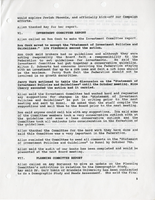Search the Special Collections and Archives Portal
Search Results
Madeline Kadin oral history interview
Identifier
Abstract
Oral history interview with Madeline Kadin conducted by Kathy Mandel on March 08, 1975 for the Ralph Roske Oral History Project on Early Las Vegas. Kadin discusses atomic testing and ranch life in Las Vegas, Nevada. She also explains the history of Helldorado and how it has changed over the years.
Archival Collection
Max Goot oral history interview
Identifier
Abstract
Oral history interview with Max Goot conducted by Charles Collins on March 22, 1976 for the Ralph Roske Oral History Project on Early Las Vegas. Goot recalls the growth of Las Vegas, Nevada after 1945. He also talks about winning the Man of the Year Award from his temple.
Archival Collection

Transcript of interview with Joan and Leslie Dunn by Barbara Tabach, June 20, 2016 and May 30, 2017
Date
Archival Collection
Description
Among the stories of those who came to Las Vegas in the 1960s to work at the Nevada Test Site is that of Leslie Dunn and his wife Joan. Leslie had been hired by the U.S. Public Health Service to monitor radiation from the explosions. He has tales flying into craters that make you wide-eyed. This assignment would last until his “retirement” in 1983 – one can’t really describe this couple as retired. During these early years, while Les pursued his scientist career, Joan’s chief focus was on raising their three children, Bruce Dunn, Loryn Dunn Arkow, and Sharon Dunn Levin. She also completed her education in accounting at University of Nevada, Las Vegas. She was involved with Equal Right Amendment efforts and League of Women Voters. The couple were only in their forties when Les left the PHS. As he looked forward to new opportunities, he felt compelled to pursue his longtime dream to become a builder, something he had dabbled at as a youngster with his father, Jack Dunn. Together, he an
Text
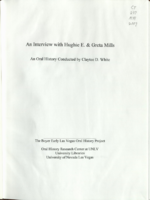
Transcript of interview with Hughie and Greta Mills by Claytee White, April 7, 2011
Date
Archival Collection
Description
Hughie and Greta Mills spent their childhoods in Charlestown, West Virginia. Fate would bring them together years later in New York City. They married in 1954. Both Hughie and Greta talk about achieving a better life through education and perseverance. He became an educator and she a librarian. In 1989, the couple relocated to Las Vegas, seeing the weather and retirement lifestyle here to their liking. During this interview they describe their lives, individually and as a couple, and how they embraced life and living in Las Vegas as a retired, African- American couple.
Text
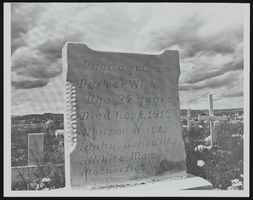
A Shoshonean headstone: photographic print
Date
Archival Collection
Description
Image
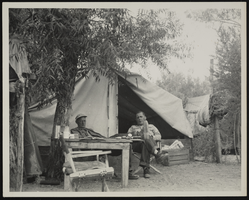
Kurt Fremstad and Ed Schroeder at a camp in Willow Beach, Arizona (identified from left to right): photographic print
Date
Archival Collection
Description
Image
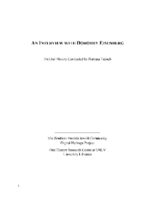
Transcript of interview with Dorothy Eisenberg by Barbara Tabach, October 23, 2014
Date
Archival Collection
Description
Interview with Dorothy Eisenberg by Barbara Tabach on October 23, 2014. In this interview, Eisenberg discusses her upbringing on the east coast and becoming a widow with four children. She met her second husband at a synagogue, and they moved to Las Vegas for a fresh start. Eisenberg became involved with Temple Beth Sholom, and the Las Vegas League of Women Voters. She has a school named after her in the Clark County School District.
Dorothy Eisenberg is a first generation American, with roots in Ukraine and Central Europe, and grew up in Philadelphia. Judaism was a significant part of Dorothy's life from the beginning, and both her and her brother spent many of their afternoons at Hebrew school and most weekends at Shabbat services as adolescents. Eisenberg moved to Las Vegas with her children and second husband in 1964. She became an influential member of the community and served as the Jewish Federation of Las Vegas's first female president. She was also actively involved in the League of Women Voters of Las Vegas Valley, including leading the organization's advocacy for school desegregation and serving as its president for two years.
Text

Transcript of interview with Bud Weil by Claytee White, December 9, 2003
Date
Archival Collection
Description
Bud Weil worked as a disc jockey in Mexico after serving in the military during World War II. In 1947, he moved to Las Vegas to work at KLAS but after two days he was job hunting. His search landed him at KENO, a radio station owned by Max and Laura Belle Kelch. His was an interview show that afforded him entree to stars performing in town. The list of his favorite interviews includes Sophie Tucker, Sammy Davis, Jack Benny, The Mills Brother, Rosemary Clooney, Leno Home, Joey Lewis and many others. In 1955, he became restless, left the career in broadcasting, and joined Max Kelch as a partner in a new venture for Las Vegas - Musak. This enterprise took him to the doors of every business in town and shortly, he knew everybody. He uses that knowledge in this interview to talk about all aspects of life as the town grew over the years. Today he is a senior statesman of our town, enjoying everything about Las Vegas except the traffic.
Text

Eric Mendoza oral history interview: transcript
Date
Archival Collection
Description
Oral history interview with Eric Mendoza conducted by Holly O'Donnell on November 29, 2021 for Reflections: The Las Vegas Asian American and Pacific Islander Oral History Project. In this interview, Eric Mendoza shares his family's chain migration history from Manila, Philippines to the United States and his difficult immigration and naturalization process once arriving in America in 1996. He talks about what brought him to live in Las Vegas, Nevada, his education and professional pursuits, what his life is like in the United States compared to that of the Philippines, and the lives of his eight siblings. Eric Mendoza discusses the historical past of the Philippines, the infrastructure in place there, and government corruption. He also speaks to Filipino traditions and festivals, food and customs, his cultural identity, and assimilating to American culture.
Text

